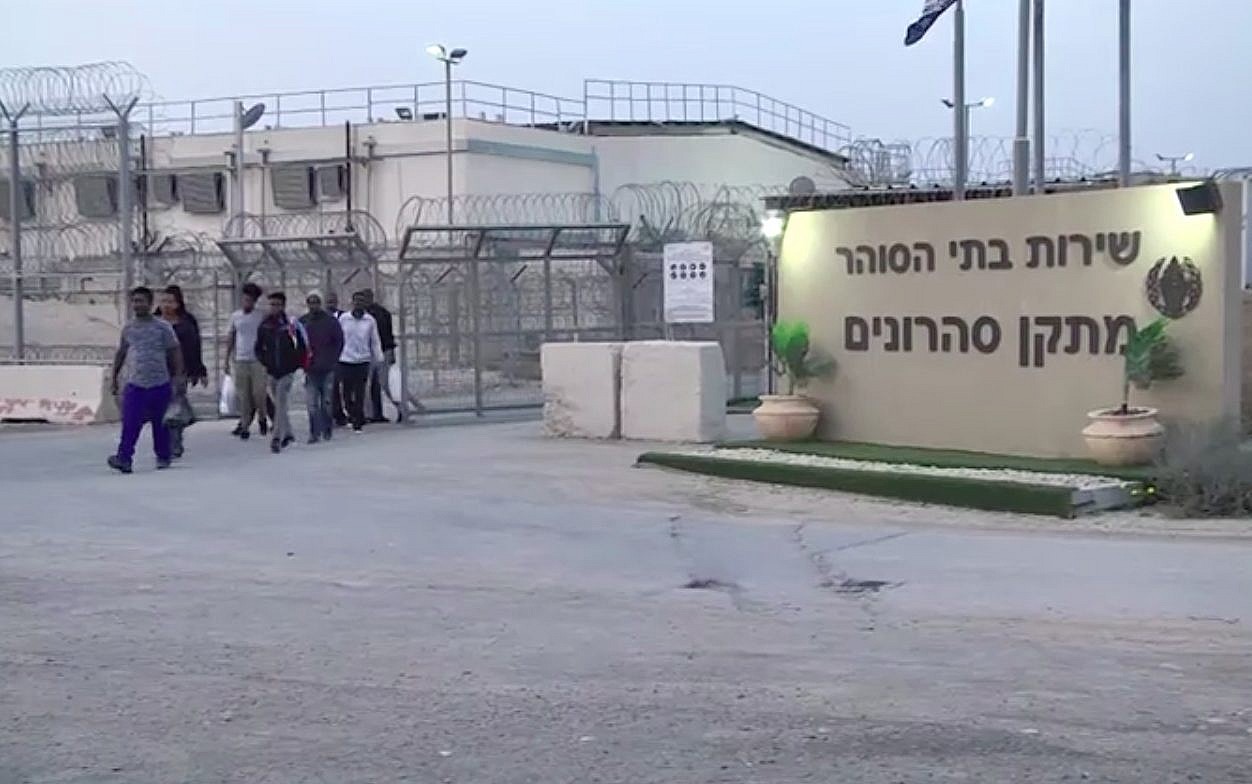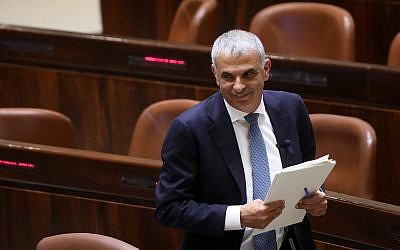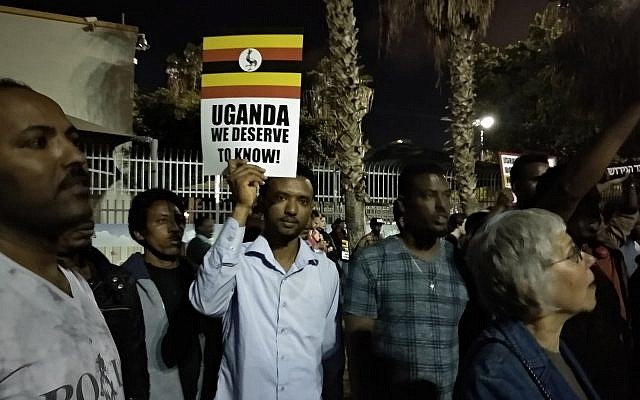The government has until 12 p.m. on Sunday, April 15, to present the High Court of Justice with a finalized plan for the deportation of African migrants. While the state insists there is a “high probability” that it will meet the court’s requirements for deportation to a third-party country, activists familiar with the negotiations have expressed doubt that it will be able to make the deadline.
Uganda’s Foreign Minister Henry Okello Oryem said in a statement last week that his nation would “insist that the airlines return [the asylum seekers] to the country where they came from…We do not have a contract, any understanding, formal or informal, with Israel for them to dump their refugees here.”

Israel’s previous expulsion plans were based on “willing deportations,” meaning asylum seekers would sign a document stating they had left Israel by choice, and receive a $3,500 grant and a plane ticket to Rwanda or Uganda. About 1,700 asylum seekers were “willingly deported” to Uganda in the past three years, but the government wants future deportations to take place much faster, at the rate of around 600 per month, rather than 600 per year. For this to happen, it needs a country that will accept asylum seekers who were forcibly deported, a stance that is unpopular in the international community.
Forced deportations to a third country is largely unprecedented in the Western world. Italy and Australia signed similar agreements with third-party countries — Italy with Libya, and Australia with Malaysia — but both proposals were shot down by local courts. In both cases, courts ruled the bills inconsistent with international law and the 1951 UN convention on refugees — to which Israel is also a party.
When the Holot detention center was closed in mid-March, legislators determined that henceforth any asylum seeker who refuses deportation will be imprisoned indefinitely at Saharonim prison in the Negev. But there are only several hundred beds at Saharonim, and the country is seeking to deport around 14,000 people, making the program difficult to enforce.
Currently Saharonim holds 212 asylum seekers who have refused deportation. Last week, after a deal with the United Nations to resettle migrants fell apart, and with a deportation agreement with Rwanda also nixed, the state released 58 asylum seekers. If no deal is reached with another third party, the state has said it will release the remainder of prisoners.

There are approximately 38,000 African asylum seekers in Israel, mostly from Eritrea and Sudan. The Population Authority has said that women, children, and married men would not be in danger of deportation. Single men account for approximately half of the asylum seeker population in Israel.
Asylum seekers who were “willingly deported” to Uganda and Rwanda in the past have told The Times of Israel they faced serious danger and even imprisonment after arriving in Africa without proper documents, and were not allowed to stay in Rwanda but forced to cross the border illegally to other countries.
Talks with Rwanda faltered and officially fell apart after the country refused to accept asylum seekers whom Israel deported against their will. Rwandan officials also balked at the court requirement that Israeli officials follow up with asylum seekers deported there.
Last week, Prime Minister Benjamin Netanyahu announced, then almost immediately canceled, a deal with the United Nations High Commission on Refugees to resettle approximately 16,250 asylum seekers and give status and rights to an equal number of asylum seekers to stay in Israel.
Netanyahu initially said that the migrants who would be allowed to stay in the country would be removed from the areas of Tel Aviv in which they were concentrated and sent to kibbutzim, agricultural villages, and other communities. He said he planned to invest the money saved by avoiding deportations into south Tel Aviv, which has a crumbling infrastructure exacerbated by the fact that the majority of asylum seekers are concentrated in the city’s poorest neighborhoods.
But the prime minister abruptly canceled the deal hours later following pressure from within his coalition and from south Tel Aviv residents in favor of the deportations.
Netanyahu then said he would continue negotiating with an unnamed country, widely believed to be Uganda, to accept deported asylum seekers, and dispatched a special envoy to lead the negotiations. Israel has canceled the deal with Rwanda, according to Tuesday’s court document, and is now hoping that Uganda will accept a deal despite public denials.
But attorney Eitay Mack, who brought the petition to stop the deportations to the Supreme Court last month on behalf of 119 Israeli activists, said he doesn’t believe that Israel will be able to close a deal with Uganda for forced deportations.

“The only state that could do this is Rwanda, because with [President Paul] Kagame there is one dictator who decides everything,” said Mack. “Uganda also has a dictator in power, but there is a parliament with a strong opposition. That’s why Uganda never had that agreement for forced deportations.”
“Rwanda is a very closed country, there was no public discourse on this, and they don’t have freedom of the press,” Mack added. “In Uganda there is a discussion. Netanyahu won’t be able to close a deal [in time for the deadline].”

One central figure said activists were appealing to the European Union to threaten Uganda with a withdrawal of aid if it signs a deal with Israel.
On Monday, activists and asylum seekers demonstrated in front of Ugandan embassies in Herzliya, Berlin, and New York, among other places. Hundreds of people demonstrated in south Tel Aviv’s Levinsky park on Monday night. About a dozen south Tel Aviv residents in favor of the deportations led a counter-protest.
Yakub, a 29-year-old asylum seeker from Eritrea, said he was trying hard to stay optimistic but felt frustrated and angry after nine years of uncertainty in Tel Aviv. “I’m afraid to leave my house now, I’m worried about going to jail,” he said on Monday night. Netanyahu “can solve this. Send us anywhere, send us to Europe. I can’t go back to Eritrea, it’s too dangerous.”
Within Israel, activists are targeting Israeli politicians in the coalition who pressured Netanyahu to back off the UN deal, including Education Minister Naftali Bennet (Jewish Home) and Finance Minister Moshe Kahlon (Kulanu). Activists were putting extra pressure on Kahlon, as other Kulanu MKs such as Rachel Azaria publicly expressed support for the deal.
A Kulanu spokesperson said Kahlon still opposes the deal because he believes that the number of asylum seekers who will be allowed to stay in Israel – approximately 16,000 – is too high. He also took issue with Netanyahu’s abrupt announcement of the deal.
“The government needs to bring a solution together, and we will support that solution,” said the Kulanu spokesperson. “The issue was with how [the deal] was done without the support of the coalition.”

UNHCR Israel spokeswoman Sharon Harel said that the deal remains on the table if Netanyahu decides to revive it. “We remain behind the message, and there is no change from our previous message,” she said.
The UNHCR deal represents a significant financial savings for Israel. The Population Authority has previously estimated that the deportations will cost Israel NIS 300 million ($86 million). The $3,500 payments to each asylum seeker alone cost NIS 207 million ($56 million), and that does not include the reports that Israel allegedly planned to pay $5,000 to Rwanda for each asylum seeker the country accepted.
Now that Rwanda has withdrawn from the deal, it’s likely that another country could ask Israel for a higher contribution for each asylum seeker, because Israel is desperate to strike a deal. That will push the cost of the deportations up even higher.
If the UNHCR handles the resettlement process, the cost will be split between the UNHCR, the resettlement countries, and Israel, said Harel. “It could save a lot of money for Israel,” she said.
Mack said he was optimistic that the government will not be able to make the deadline on Sunday to report details of a new deal to the High Court.
“Everything has collapsed, we’re just waiting for the government to announce it,” he said. Mack slammed the government for acting “irresponsibly and immaturely” throughout the entire process.
“Right now, I’m happy for the asylum seekers, but sad for Israel because of how this played out,” he said.





